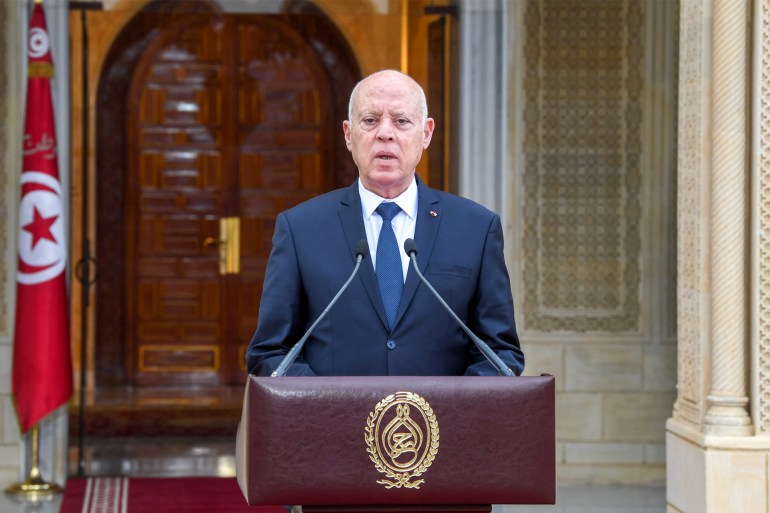Tunisia -
Controversy continues in Tunisia, and political attitudes escalate after the President of the Republic issued a decree amending the electoral commission law and replacing its members.
Al Jazeera Net spoke to Rashid Ghannouchi, head of the Ennahda movement and the dissolved parliament, about his position and his reading of the political scene after this decree.
Ghannouchi expressed his categorical rejection of this decree "because it completely contradicts the constitution, specifically its 70th chapter," which clearly states that the electoral system, including the electoral commission, cannot be changed by presidential decrees.
He added, "The dissolution of the electoral commission is one of the episodes of the head of state to stifle the democratic project and finish it off, which he started by dissolving the parliament and the government, and then proceeded to dismantle the constitutional bodies such as the constitutionality monitoring body, the National Anti-Torture Authority, and the Supreme Judicial Council, and now has arrived to hammer the last nail in the coffin of democracy." by dissolving the Electoral Commission.
President Said’s decree completely contradicts the constitution, specifically its 70th chapter, according to Ghannouchi (communication sites)
Doubting the authority Questioning the legitimacy of Saeed
Ghannouchi stresses that the Independent Electoral Commission is constitutionally elected by two-thirds of the people’s representatives in Parliament, and that it has led a series of electoral stations in the country, without anyone questioning its integrity or the independence of its members despite the many conflicts and disputes.
He continues, "The head of state's questioning of the independence of the commission is questioning his legitimacy, because it was the same commission that brought him to power during the last presidential elections and gave him more than 70% of the vote."
On the other hand, the head of the Ennahda movement praised the position of the head of the electoral commission, Nabil Buffon, who considered that the independence of the commission was at stake after the president's decree that gave him the power to appoint all members of the commission and its president.
He explains, "The head of the electoral commission was successful in his statement, because with this decree we are no longer before an independent national body, but the electoral process will be run entirely from the presidential palace."
Regarding the voices questioning the independence of the commission and accusing it of not being impartial and nepotism towards certain parties and ignoring electoral violations and suspicious financing of parties, Ghannouchi considered that all of these remain accusations without any evidence, and that “there is a judiciary in Tunisia that seeks to establish its independence that no case has been raised that question this commission, or In any electoral process it supervises, including municipal elections.
Ghannouchi stresses his certainty that Tunisians will defend the gains of their revolution in the presence of a lively and moving street, a vigilant civil society, and state institutions in which the values of freedom and independence have been firmly established, adding, "It is impossible for this people to accept replacing the rule of law and freedoms with the state of the tyrannical individual."
Regarding his position on the "Salvation Front" initiative announced by Ahmed Najib Chebbi, head of the political body of the Amal Party, the head of the Ennahda Movement valued this step.
He said, "Our expectations are that this front will open a path to restore democracy and put Tunisia's train back on the path of democracy, and we are certain that the revolution deepened its principles in an entire generation that grew up within the framework of freedom, democracy and the constitution and is not expected to give up easily."
It is noteworthy that the composition of the current electoral authority - which oversaw the management of the past legislative and presidential elections - was elected by the dissolved parliament by a two-thirds majority, while the new presidential decree grants Saeed the power to appoint all of its members by order of him, and to choose its president.

